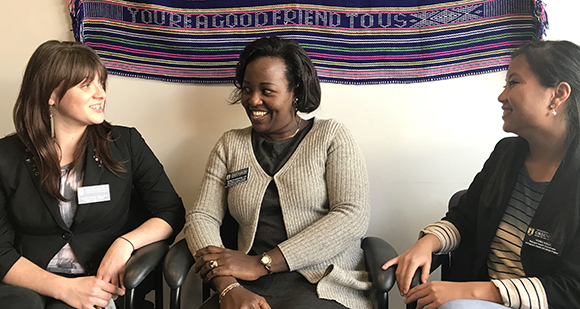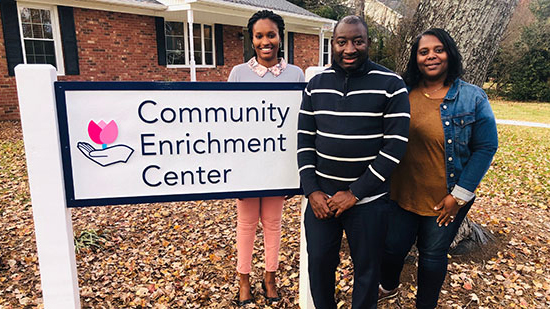Community gives us unlimited capacities to grow.
After five months of being closed due to COVID-19, the CNNC Community Centers reopened in September.
Located across the city of Greensboro are our three community centers: Glen Haven, Oakwood Forest, and the newest center, the Community Enrichment Center. The Community Centers support the integration of newcomers by creating opportunities for education, health, employment, and advocacy.
Thousands of refugees come from difficult situations and are relocated to unknown environments across the US – these decisions are made by the United Nation High Commissioner for Refugees (UNHCR) in collaboration with resettlement agencies, and can leave families to deal with the culture shock and language barriers.
The Community Center Program at the CNNC takes a holistic approach to support these newcomer families by facilitating educational after school care, citizenship and employment classes, and healthcare checkups.
The ethos of our Community Centers is centered on equity and justice and propelled by our leaders’ personal urgencies to help and to heal.

Natacha Nikokeza, the Community Centers Senior Program Coordinator, came to the US 11 years ago as a refugee herself. When she left her home country, Burundi, she never imagined the physical and mental struggles that adjusting to a new country entail.
Recognizing her own needs led her to begin volunteering as an interpreter and transporter. Ultimately, she decided to dedicate herself toward enhancing the lives of other refugees and immigrants.
COVID-19 Intensifies Barriers
Natacha’s client-centered work is guided by our community members’ personal exigencies. Although battling COVID-19 is currently the most demanding issue, the reality is that it has only intensified already existing barriers.
When schools were planning to reopen in a COVID-19 world, they did not imagine or account for the challenges immigrant and refugee children face — the lack of technology, internet access, and space for learning/working as well as overall lack of digital literacy. Kids were expected to do remote learning when they did not have the skills nor resources to support that transition, and parents were left powerless.
To address these problems, the Community Centers Coordinators created WhatsApp groups to communicate with families so they could stay connected – our community leaders sent voice messages in different languages and shared updates about COVID-19 in order to spread education and awareness.
The Joy of Reopening
The Community Center’s reopening was emotional for the many people who were yearning to gain their community back.
Pre-COVID, a typical day at Oakwood Forest would serve around 20-30 kids in the after school program; while kids received homework help, about 15 moms participated in ESOL and parenting classes. At Glen Haven, we would assist about 40 kids daily and more than 100 families a year, and our newest center, the Community Enrichment Center, provided Employment services and ESOL classes to more than 60 individuals monthly (the center serves 4 apartment complexes with more than 600 families).
So on Sept 28th, the reopening invigorated many spirits. With the kindness and support from our allies at the UNCG Lloyd International Honors College (LIHC), 50 new tablets provided mobility for remote learning at all three Community Centers.
Access to these new tablets has allowed these interactions to happen in an outdoor setting where our volunteers now teach community members how to navigate new online systems and enhance their digital literacy.
Dr. Omar Ali, the Dean of the Honors College, explained how this donation was generated not only out of the desire to support the CNNC and the Community Centers, but to also express gratitude. He views the Honors College’s partnership with the CNNC as integral to the growth of the community as a whole since.
As Dr. Ali puts it, the integration of newcomers shapes the character of our city and enriches us.
Dr. Ali’s connection to the CNNC goes back to his early days at UNCG when he first started as a faculty member in 2010. He felt a personal connection to the CNNC’s mission that now dovetails with that of the Honors College whose students gain an education in global and cultural affairs. Honors College students now also engage in social change through volunteering at the Community Centers. Natacha and Dr. Ali continue to collaborate as they conduct workshops in Honors College classrooms and in the Community Centers. Their relationship reflects how cooperation among the university and community can provide resources to enrich all our lives.
After nearly seven, arduous months of coping with the global pandemic, daily life has significantly changed, and many aspects have been put on pause. The CNNC remains loyal and steadfast in its commitment to serving immigrant and refugee families in the Community Centers. In these unprecedented times, these moments of kindness give us hope. When we provide resources to a family, we empower a community.
Further support for the Community Centers is always appreciated. One can reach out, visit our website and social media platforms (Facebook, Twitter, and Instagram Instagram), volunteer, or donate time, money, dry goods or office supplies. Let’s keep caring for each other.
Janie Raghunandan
CNNC Marketing and Communications Intern

